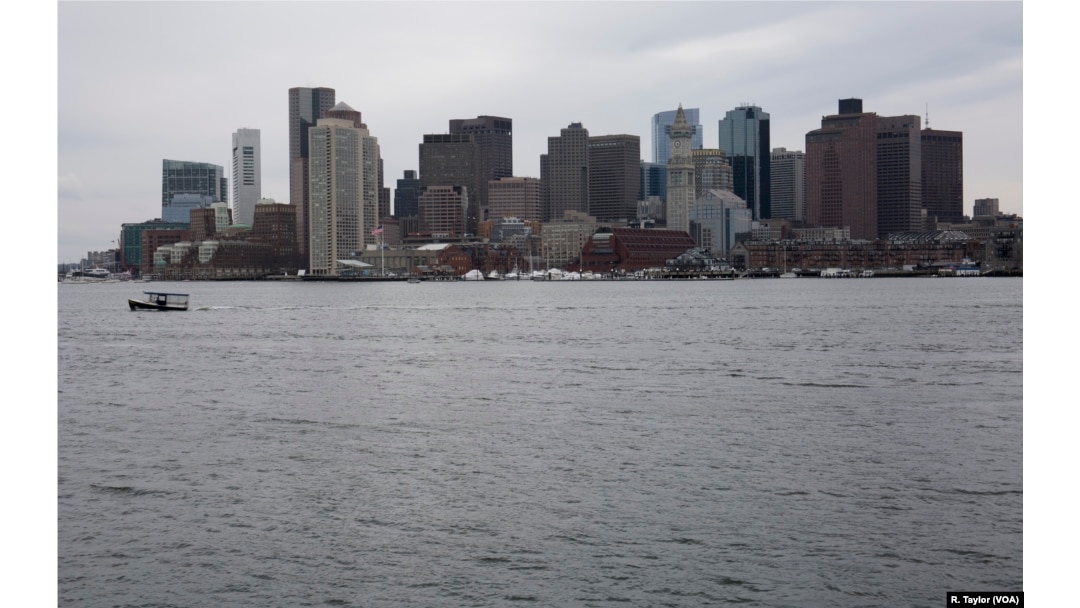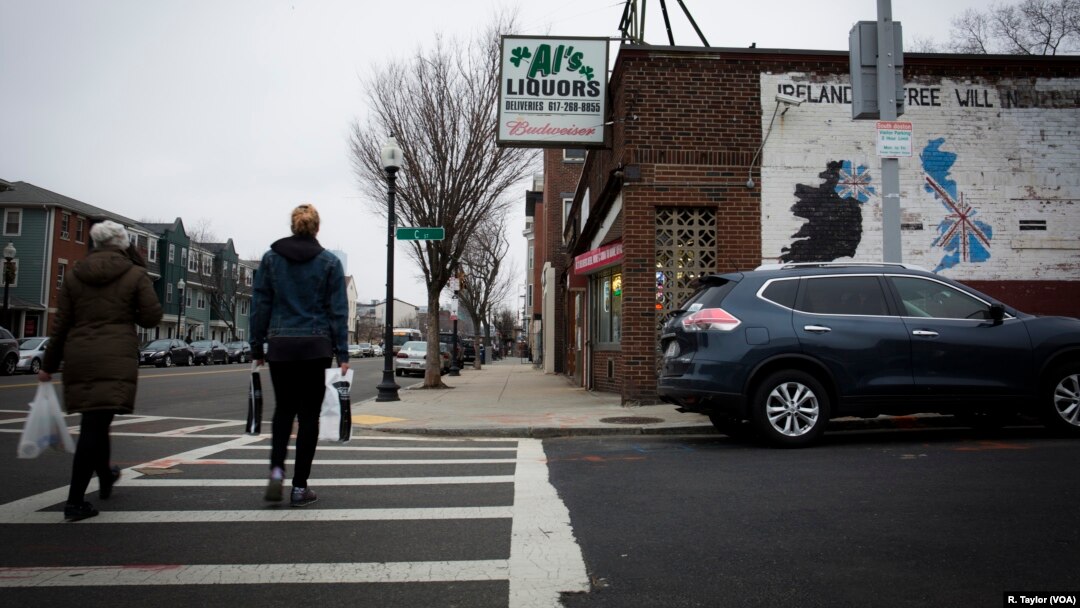In Boston's Irish neighborhoods, word on immigration spreads quietly and quickly. Reporters are met with suspicion.
"The last person who gave an interview, he ended up getting deported. You know that, right?" asked Thomas Callahan, an undocumented Irishman who reluctantly provided his full name.
He and others recall John Cunningham — a prominent, outspoken Bostonian who, like many undocumented Irish, overstayed a 90-day visa and was deported last year after nearly two decades in the U.S. A few months before his detainment, Cunningham had spoken about his status on Ireland's RTE television station.

The downtown Boston skyline, as seen from East Boston.
"The way things are going, it's not safe," Callahan said.
"Everybody is walking on eggshells," added his friend P.J.
The number of deportations among the Irish in the U.S. — 26 removals in 2016, 34 in 2017 — pales in comparison to those for numerous other ethnic groups in the United States. But the resulting 31 percent increase is still cause for concern in a community that, in recent years, has not been used to such scrutiny.
WATCH: U.S. Deportations by Country
Your browser doesn’t support HTML5
US Deportations by Country
"Most Americans, when you're working on jobs, they don't see you as an illegal immigrant," Callahan, a carpenter, said about being Irish. "They presume that you're all set just because you're white and you speak English … little do they know that you're actually undocumented, as well."
Though Callahan has lived in the country on an expired visa since 2002, he says the level of concern within his community has become "more prevalent" and has been on "a lot of people's minds" since President Donald Trump took office.
The prospect of being jailed for weeks or months is what most frightens Callahan. But his mother is currently battling stage IV cancer in Ireland and he grapples with a decision he hasn't yet made: whether to permanently leave the life he has built and visit her before it's too late.
Historical privilege
The estimated number of undocumented Irish living in the U.S. varies drastically, from 10,000 to upward of 50,000.
Dating back to the Great Irish Famine of the mid-19th century, thousands settled in Greater Boston. They remain the metro area's single-largest ethnic group at 23 percent.
The much-maligned Diversity Immigrant Visa Program was originally intended to help Irish immigrants in the 1980s, when the bulk of U.S. immigration was shifting to Central America and Asia. In recent years, most winners of the diversity visa come from Africa and Asia. Trump has called for the program to be eliminated.
The Irish today see a different set of immigration challenges than generations before them. Among them are extensive wait times for family-based immigrant visas and a complex employment sponsorship process, according to Kieran O'Sullivan, an Immigration, Detention and U.S. Citizenship Counselor at the Irish Pastoral Centre (IPC) of Boston.
Four generations of U.S.-based soldiers, police officers and firefighters are on display inside the living room of Kieran O’Sullivan, an immigration counselor at the Irish Pastoral Centre of Boston. (Photo courtesy of Kieran O’Sullivan)
"Many people who even try and take on the process of getting sponsorship through employers fall out of status during that process, and some other immigrants don't have the price of the attorney's fees, the filing fees," O'Sullivan explained.
Overall, the challenges faced by the undocumented Irish, he says, are like those of other immigrant groups.
"The Irish landscaper is no different from the hardworking painter from Guatemala, who is here trying to provide for his family. Our fear is that it's driving people further underground," O'Sullivan said.
WATCH: Boston Irish community on edge after increase in deportations
Your browser doesn’t support HTML5
Deportations Are Up Among Boston’s Undocumented Irish
"We would meet a lot of people who are struggling with depression and anxiety," added Veronica Keys, a clinical social worker at the IPC, whose clients represent a range of nationalities. "That would be true especially, I think, of the immigrant community, because they tend to be isolated, away from home.
"[Those] from the Middle East or maybe an African country, they feel that they experience their discrimination more overtly," she said.
But Callahan is feeling his own pain. "We're not stuck like the Mexicans, where they're going back to really bad times, but I'm here almost 16 years," he said. "It's very hard to leave. You've made a life here for yourself."
Land of the free?
In "Southie," a once predominantly working-class Irish neighborhood in South Boston, lavish modern apartments border decades-old pubs and family diners. Among Irish descendants who grew up and still live there, a mixed narrative on immigration emerges.
Irish-born Pete Clougherty, a Vietnam veteran, immigrated to the U.S. with his parents in 1957.
"Who built America?" asked Pete Clougherty, a Galway, Ireland-native Vietnam veteran who immigrated with his parents in 1957. "The ones that came here before us!"
"A lot of [undocumented immigrants] are running from bad things in their country," Clougherty said. "Where else could they turn to when stuff like that happens?
Down the street, Mary Evans, a former custodian and third-generation Irish-American, recalls the "No Irish Need Apply" era of the 1850s as proof of her ancestors' hard-earned respect — something that, in her mind, has been exploited by newer immigrants who misinterpret the meaning of "land of the free."
Irish-American Mary Evans believes newer undocumented immigrant groups often misinterpret the meaning of “land of the free,” and are less entitled to live in the U.S. than older immigrant groups like the Irish.
"A lot of people's ancestors had to work their way up to get the respect that they got," Evans said. "When you're here illegally, it's like, you don't have any roots whatsoever here in America to prove that, 'Oh, I deserve that too.' Just like the Irish deserve this."
Keys says that among the Irish population in the U.S., there is a generational divide in part due to a lack of awareness of immigration policy changes post-mid-century. "They say, 'Why can't they do it the same way we did it?'"
However, Keys notes, understanding is growing.
"The Irish are more vulnerable now, so it's probably made them aware of the fact that they have much in common with other immigrant groups," Keys said. "Boston in particular [is] Irish-American, largely. So, you sort of fool yourself into thinking that you're part of the majority."


